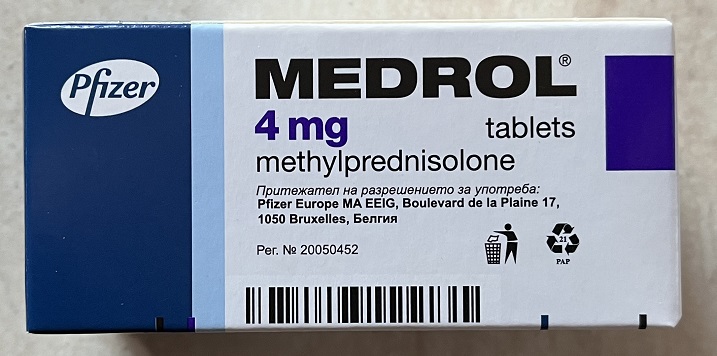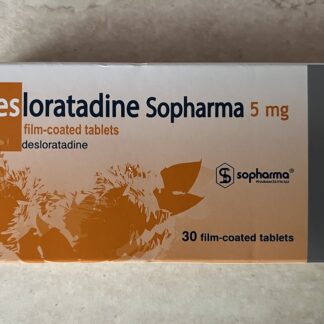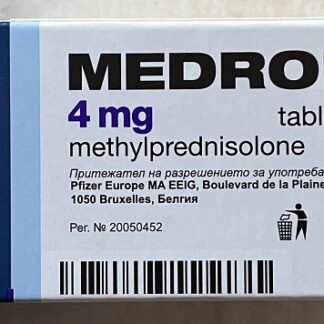Description
Medrol belongs to a group of medicines called corticosteroids. Corticosteroids are hormones that are naturally produced by your adrenal glands, which are located above your kidneys. They help the body cope with inflammation, allergic reactions and other stressful situations. Your medicine is a synthetic corticosteroid, similar to the natural hormone, and it has the same effect.
It has two main actions. First, it stops the inflammation (pain, swelling, redness and warmth) in your body. Its other action is to lower the activity of the immune system. This is useful, for example, in conditions where the immune system attacks the patient’s own body (autoimmune reaction), causing damage, or when it causes a strong reaction to a substance that the patient comes in contact with (eg an allergy).
It is not an “anabolic steroid” that some people abuse for bodybuilding purposes.
Your tablets can be used to treat:
Rheumatic diseases:
joint inflammation in psoriasis (psoriatic arthritis);
autoimmune disease with inflammation affecting the joints and / or other parts of the body in adults or children (rheumatoid arthritis);
ossification and adhesion of the joints of the spine and pelvis between them (ankylosing spondylitis);
inflammation of the periarticular sac (acute and subacute bursitis);
inflammation of the vagina of a muscular tendon (acute nonspecific tendosynovitis), inflammation of the joint in gout (acute gouty arthritis);
inflammation of the joint after trauma (post-traumatic osteoarthritis);
inflammation of the intra-articular mucosa (synovitis in osteoarthritis) inflammation of the tendon at the site of attachment to the bone (epicondylitis).
Collagenosis:
inflammation of the muscles (dermatomyositis or polymyositis), inflammation of the arteries (giant cell arteritis);
involvement of the heart muscle in rheumatism (acute rheumatic carditis);
autoimmune connective tissue disease characterized by a rash accompanied by fever, arthritis, inflammation of the blood vessels, renal disorders and disorders affecting the brain (systemic lupus erythematosus).
Skin diseases:
appearance of blisters on the skin (pemphigus vulgaris), other skin diseases (bullous herpetiform dermatitis, severe erythema multiforme (Stevens-Johnson syndrome), exfoliative dermatitis, mycosis fungoides, severe psoriasis, severe psoriasis, severe sematitis).
Allergic conditions:
asthma with inflammation of the lungs and airways (bronchial asthma); severe forms of hay fever and other allergies accompanied by runny nose (allergic rhinitis); allergies to certain medicines (such as penicillin) and allergies to vaccines made from animal serum (serum sickness); skin allergy due to contact with certain substances (contact dermatitis); chronic inflammation of the skin, characterized by red spots and severe itching (atopic dermatitis).
Eye diseases:
inflammation of the front of the eye (iritis or iridocyclitis); inflammation of the back of the eye (posterior uveitis); inflammation of the optic nerve (optic neuritis) and other eye diseases (allergic ulcers of the corneal edge, shingles ophthalmicus, inflammation of the anterior segment of the eye, choroiditis, sympathetic ophthalmia, allergic conjunctivitis, keratitis, chorioretinitis).
Lung diseases:
inflammation of the tissues and lymph glands of the lungs (pulmonary sarcoidosis); inflammation of the lungs as a result of the penetration of eosinophils (a type of white blood cell) in them (Lofler’s syndrome); chronic pneumonia due to inhalation of beryllium oxide particles (beryllium); tuberculosis that progresses rapidly or has spread to other areas (taken concomitantly with anti-TB drugs); inflammation caused by aspiration of gastric contents or vomiting in the lungs on unconsciousness (aspiration pneumonitis). Blood diseases; bleeding on the skin or other parts of the body due to low blood cell counts that help with blood clotting (idiopathic thrombocytopenic purpura); low number of blood cells that help blood clotting in adults (secondary thrombocytopenia);
Malignant diseases:
excessive formation of white blood cells in the bone marrow in adults (leukemia); adult blood cell cancer (lymphoma); acute leukemia in children.
Island conditions:
to increase diuresis (urine output) in nephrotic syndrome (kidney disease).
Intestinal diseases:
inflammation and ulceration of the colon (ulcerative colitis); inflammation of various parts of the intestine (regional enteritis).
Other conditions:
multiple sclerosis; tumor-induced cerebral edema; helping to stop the rejection of transplanted organs or tissues; tuberculosis infection causing inflammation of the meninges (meninges), along with anti-tuberculosis drugs; disease caused by ingestion of trichinella-infected meat (pork) that has not been fully cooked (trichinosis).
Your doctor may use Medrol to treat conditions other than those listed above. Ask your doctor if you are not sure why you have been prescribed this medicine.



